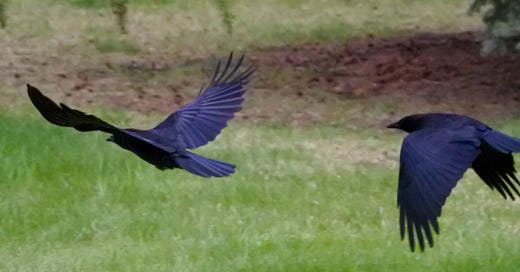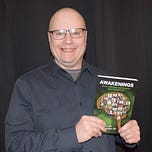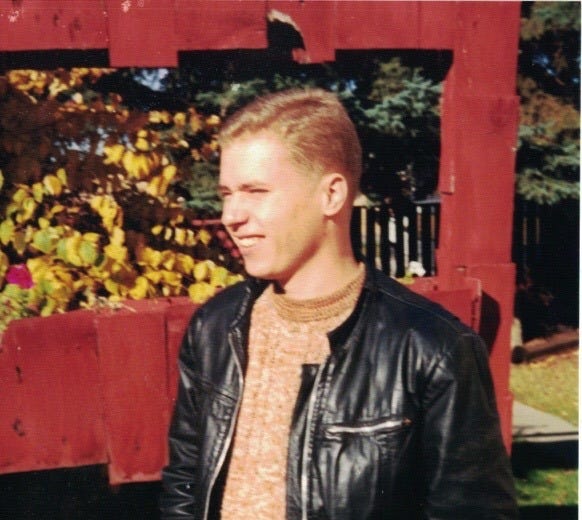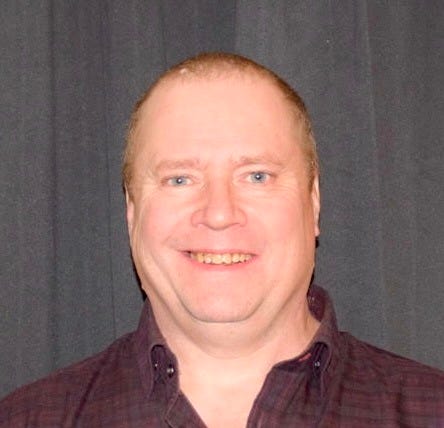An old photo of me from my early 20s. I showed it to a friend once and she said, “wow, you really had the whole Val Kilmer thing going then didn’t you?”
A photo of me now, at 53.
Hello to all my readers and listeners. In the accompanying podcast, I talk about the process of becoming a mental health advocate through writing. Unfortunately, with the limited time I am allowed, I couldn’t cover much more than basic magazine writing and journalling. Journalling is something that was recommended to my mom by her psychiatrist years ago, and something I began doing when I first found myself living alone in an apartment after being released from psychiatric care, having way too much time on my hands and knowing writing was where I wanted to take my life.
Journalling is a great way to start because when a person wants to write, they may not know what they want to write about, or have much experience with the subject. Most substackers have likely taken high school and also likely college English classes, but few teachers at that level can show a person how to make a financial/commercial success of their writing. I definitely don’t feel there is a need to make money off of writing, but if you can do it, why not try to combine something you may (or may not) love doing, and are good at, with something that brings in a little grocery money.
I have been fortunate enough to have the support of The Schizophrenia Society of Alberta and they have not only supported me but employed me as a public speaker, and I will never stop thanking my boss for her support during a hospital stay I had a few years ago. Before joining the Society, I had a good deal of public speaking experience, some from attending support groups for years, and some from training I had received from Toastmasters when I was in Air Cadets. That being said, I would encourage anyone who wants to not only learn about communication, public speaking, leadership, and meet some wonderful people to set sail for a Toastmasters meeting in their area. I started going about 2-3 years ago and it has done me a world of good. In recent times I have even been informed that I can potentially take on speaking jobs that could pay well. At the core of Toastmasters is having the ability to write a compelling speech, which is basically a short story where you want to draw in your audience, compel them to be interested in your story, have a climax or conflict point, then wrap up with a strong conclusion. This of course isn’t a template to fit every speech, but one of the many ways one can make a speech a success.
I have now written and self-published 12 books, which includes 4 books of poetry, three memoirs, three short story collections and two novels. None of these books had a conventional publisher, but I have a hope that one day soon, with the help of substack and what I am learning from you, my dear readers and listeners, that I will be able to find a conventional publisher. In truth though, I find a lot of contentment and enjoyment just writing about mental health and getting all the kind feedback and support everyone has allowed me. I also often wonder if some of my books, especially the short story and poetry books should have had more supervision, better editing and more effort put into them.
Just to go back to one or two things I wanted to mention about writing, it is a fantastic idea to find out if you have a community newspaper in your area. Where I live we have a paper called “The Boyle-McCauley News” which I volunteered for and continue to do photography assignments for. This is a great way to connect with people who can help you with your writing journey and give you advice and support. It will most likely not pay, and it can rarely be used as an example of previous work that editors often ask for, but there are so many other rewards, including starting to make solid friendships in your community, and connections that could indirectly help your writing. As a result of working for my local paper, I met one couple who were both writers, one of them previously and editor with a PhD in English. They were kind enough to help edit my short stories and when my friend put a book out, I got a free copy in exchange for a review. The book was brilliant.
I have talked a lot about magazine writing here and in today’s podcast. I should also mention something that helped me a great deal, The OpEd Project. (please google) This is an organization that trains people to write OpEd articles. There is a cost to take their classes (one of them is “Write to Change the World”) but you can apply for a scholarship if needed, and they are generous in giving them out. The articles I have written were unpaid, but the exposure I had did lead to paid work. Basically the principle of The OpEd Project is that we need to change who writes history. Through them I have published numerous articles in newspapers, and each time I have done so in my home city (Edmonton Journal) I have been interviewed by a local news radio station. I also wrote a piece for the CBC which made my story into a 5-minute documentary with me as the subject and showed it on TV. Writing, especially when we have training and the right supports, is such a powerful thing. Check out the link below to view.
https://www.cbc.ca/player/play/video/1.6575117
















Share this post